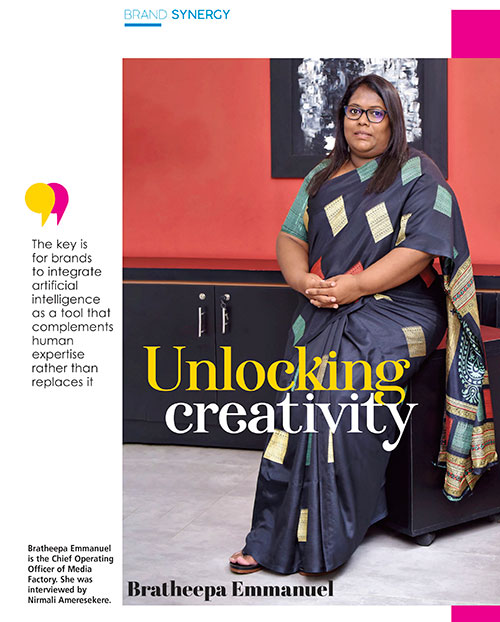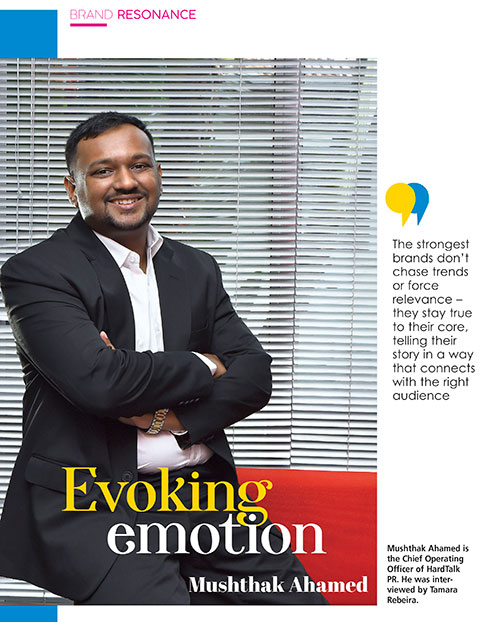BRAND PROMISE
Conspicuous presence
Nathasoruban Sivapatham
Q: How would you define a strong brand – and what key elements contribute to brand building?
A: For a product to become a brand, it must first fulfil its promise. Furthermore, a brand should showcase its space and actively engage consumers to own the promised brand space.
Keeping that promise fosters an emotional bond where even though the product is no longer an option, the brand becomes the option for consumers. To fulfil this, the brand should have hassle free access without leaving space for alternatives. A strong brand also needs a unique and recognisable identity across all platforms.
It should constantly evolve, innovate and stay ahead of consumer needs, in order to remain relevant and competitive. And a strong brand must communicate a clear promise throughout its communication platforms.
Q: In today’s competitive landscape, what challenges do businesses face when developing a brand identity?
A: Two elements shape brand identity – viz. the need for innovation and connection with consumers; and the rise of cheaper and unregulated alternatives.
To stay relevant, brands must continuously innovate and adapt to lifestyles and expectations – especially those of younger generations who shape trends. Understanding their interests and engaging with them is crucial. Communicating a unique brand promise and maintaining consistency across platforms strengthens brand trust and recognition.
Additionally, economic pressures push consumers toward cheaper lesser known alternatives, some of which bypass taxes and regulations. To combat this, strong brands must offer more than simply a product, and provide after sales service, warranties, value added benefits and accessibility.
This differentiates them from low-cost alternatives, and fosters long-term satisfaction and brand loyalty.
Q: In an era dominated by social media and digital platforms, how can brands differentiate themselves and maintain consumer loyalty?
A: In today’s digital era, where social media dominates and consumer feedback is visible, brands must uphold promises and ensure customer satisfaction. A strong presence with positive engagement is essential as public perceptions can rapidly shape a brand’s reputation.
Unlike traditional media, social media provides consumers the freedom to engage with brands on their own terms. This creates a unique opportunity for brands to craft personalised content that resonates with target audiences. Its advantage lies in the ability to precisely connect with consumers at a deeper level.
To stay relevant, brands must embrace social media as more than simply a promotional tool. They should create content that’s both entertaining and informative while leveraging real-time events and trending topics, to foster interaction and maintain consumer loyalty.
Brands should also embrace e-commerce in a manner that provides genuine convenience and trust for consumers, free of excessive costs or system hassles.
Q: What are the most effective marketing channels for building brand presence today?
A: There’s no fixed formula for effective marketing channels. In creative communications, creativity involves strategically disrupting and adapting channels to best suit the brand.
Traditional marketing is losing its effectiveness as consumers lead busy lives. Entertainment platforms prioritise content over advertisements and make it harder for brands to rely on traditional ad placements. Additionally, consumer attention spans have shortened to a swipe of the screen, making engagement challenging.
To select effective marketing channels, brands must focus on the five ‘Ws’ – when, where, what, why and who.
Success lies in finding the right channels that align with the brand’s space and audience behaviour. Understanding these factors helps brands break through the noise and foster meaningful engagement.
Marketing channels should be adaptable rather than dictating trends. A brand with a strong purpose can disrupt conventional channels and create new ones hat resonate with consumers at the right moment.
The key to effective marketing lies in delivering the right message at the right time in a space where consumers are naturally open to engaging with it.






